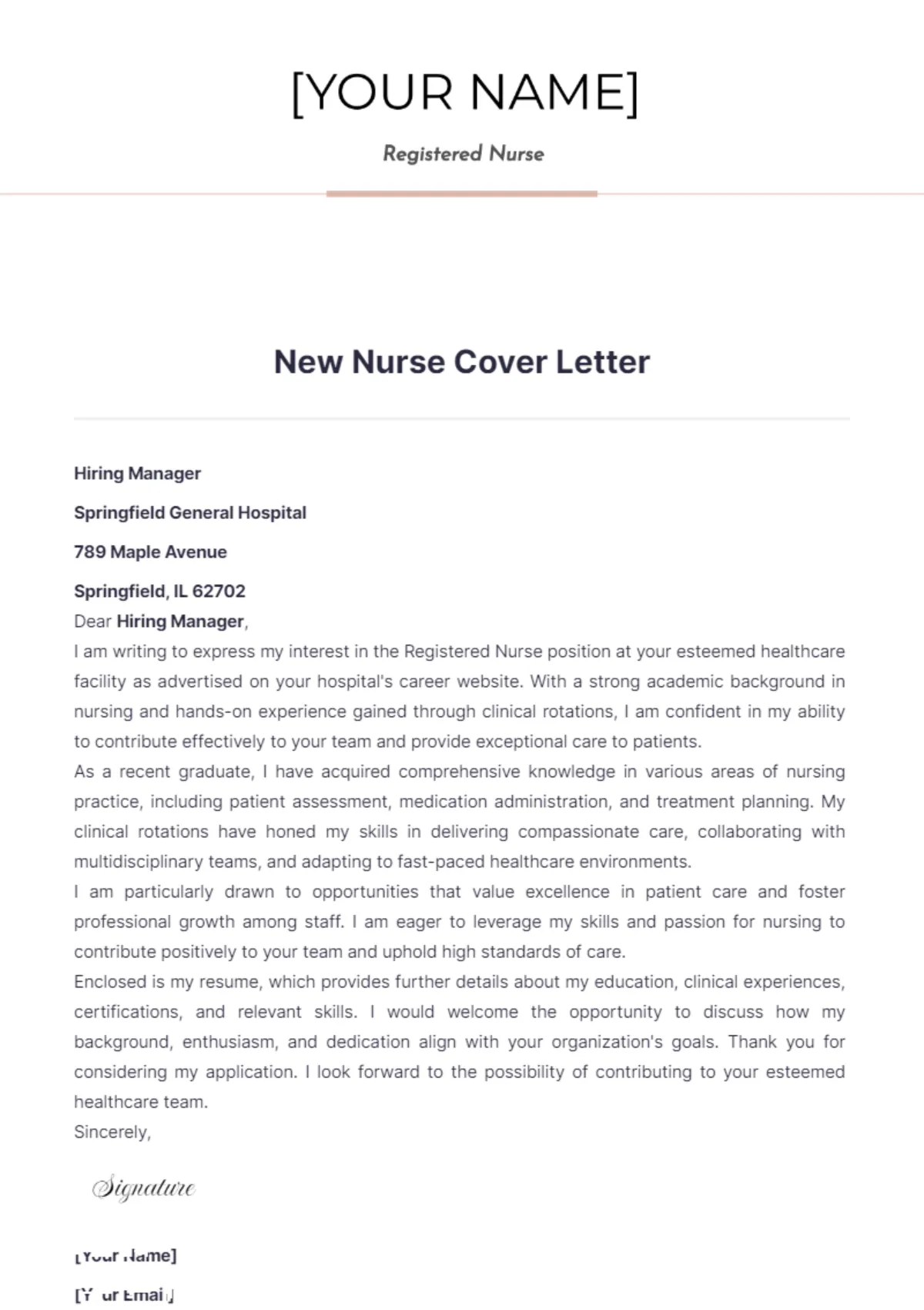Understanding the Importance of a Cover Letter for New Nurses
As a new nurse, you might wonder if a cover letter is truly necessary. In today’s competitive job market, the answer is a resounding yes. A well-crafted cover letter provides an invaluable opportunity to introduce yourself, express your interest in a specific position, and highlight your unique qualifications beyond what’s listed on your resume. It’s your chance to make a positive first impression and showcase your personality, passion for nursing, and commitment to patient care. A strong cover letter can significantly increase your chances of securing an interview, as it demonstrates your attention to detail, strong communication skills, and genuine enthusiasm for the role.
Key Components of a New Nurse Cover Letter
Your Contact Information and the Date
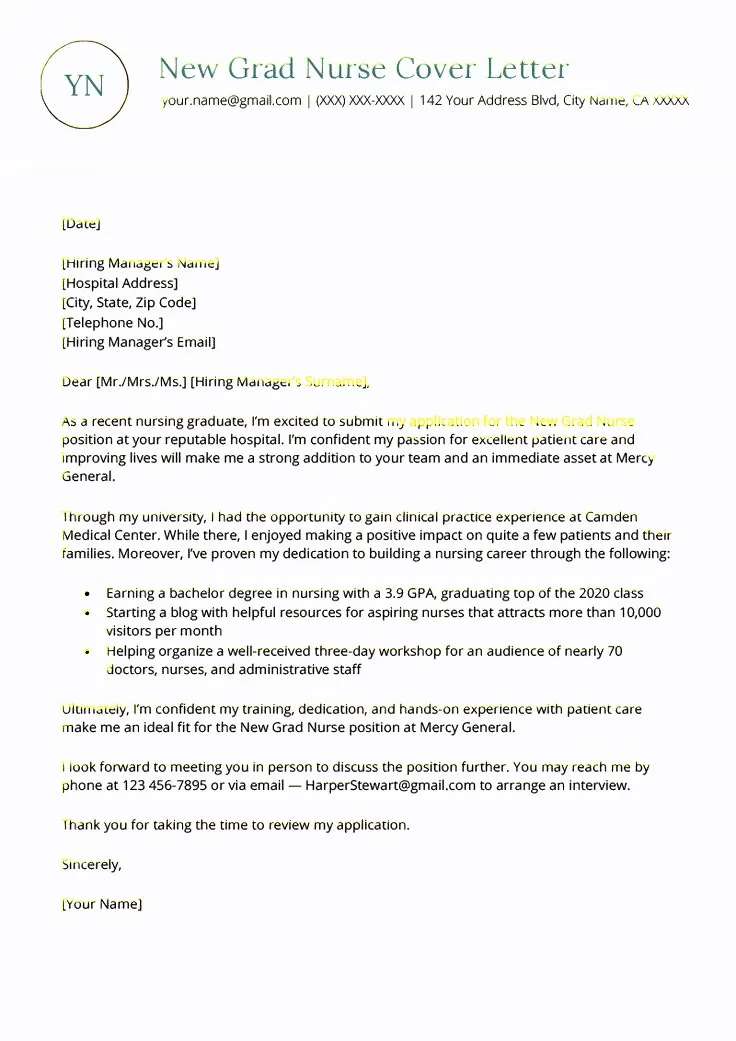
Start with your full name, address, phone number, and professional email address at the top left. Include the date directly below your contact information. This allows the hiring manager to easily identify you and know when the letter was written. Make sure your contact information is accurate and up-to-date. Double-check the spelling of your email address, and ensure your voicemail is set up professionally. This section sets the stage for a professional presentation.
Addressing the Hiring Manager
Always address the hiring manager by name if possible. Research the company and the specific role to find out the hiring manager’s name. If you can’t find a name, use a professional salutation like “Dear Hiring Committee” or “Dear [Department Name] Hiring Manager.” Avoid generic greetings like “To Whom It May Concern” as it can make your letter seem impersonal and less engaging. Personalizing the address shows you’ve taken the time to research and are genuinely interested in the position.
Opening Paragraph
The opening paragraph is your first chance to grab the hiring manager’s attention. State the position you are applying for and where you found the job posting. Briefly explain why you’re excited about the opportunity and what initially attracted you to the organization. Keep it concise, enthusiastic, and highlight your key skills. For example, you could mention your passion for patient care or a particular area of nursing you’re interested in. This paragraph sets the tone for the rest of your letter, so make it count.
Highlighting Your Skills and Qualifications
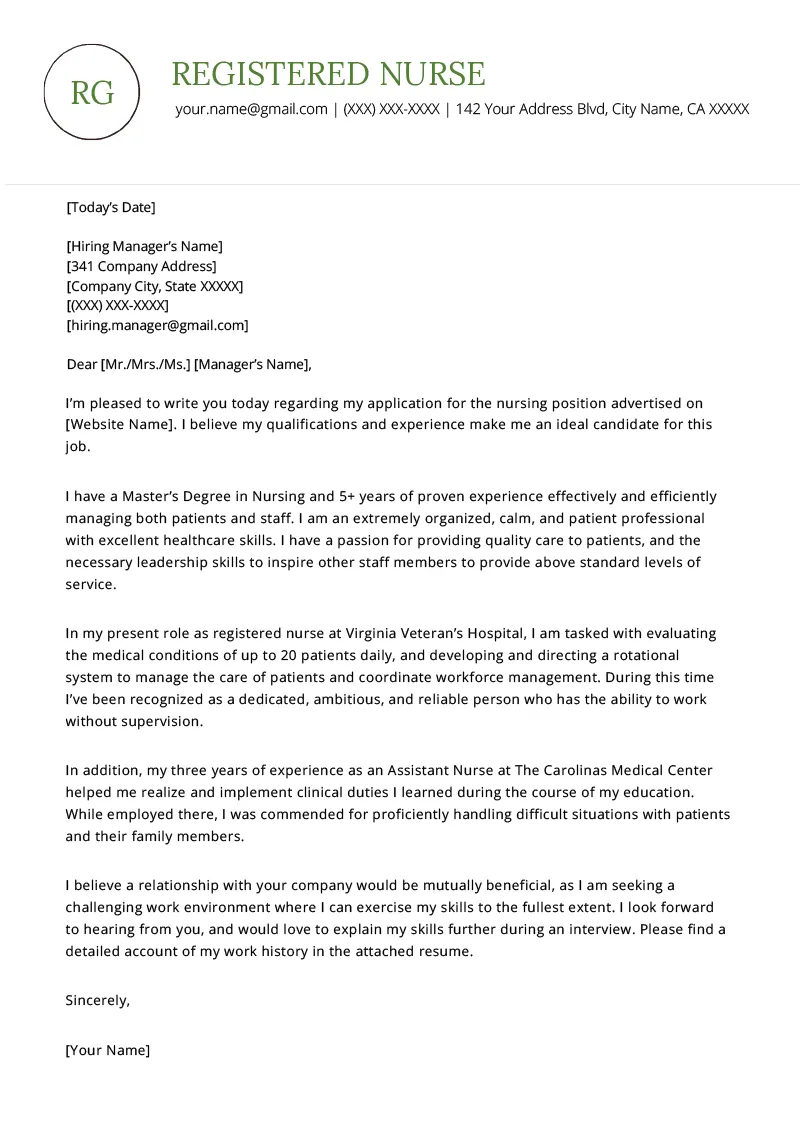
Showcasing Relevant Experience
Even as a new nurse, you likely have clinical experience from your nursing program, clinical rotations, or volunteer work. Briefly describe your experience, focusing on the skills and responsibilities most relevant to the job. Highlight any specific patient populations you’ve worked with or any specialized procedures you’re familiar with. Use action verbs to describe your accomplishments, such as “Assisted in the care of critically ill patients” or “Managed medication administration.” Tailor this section to the specific requirements listed in the job description.
Emphasizing Soft Skills
Nursing requires more than just technical skills; soft skills are essential. Highlight your communication, teamwork, problem-solving, and critical-thinking abilities. Provide specific examples of how you’ve demonstrated these skills in a clinical setting. For example, “Successfully communicated with patients and their families to explain complex medical information” or “Collaborated effectively with a multidisciplinary team to ensure comprehensive patient care.” Showcasing these skills demonstrates your ability to work effectively in a healthcare environment.
Quantifying Achievements
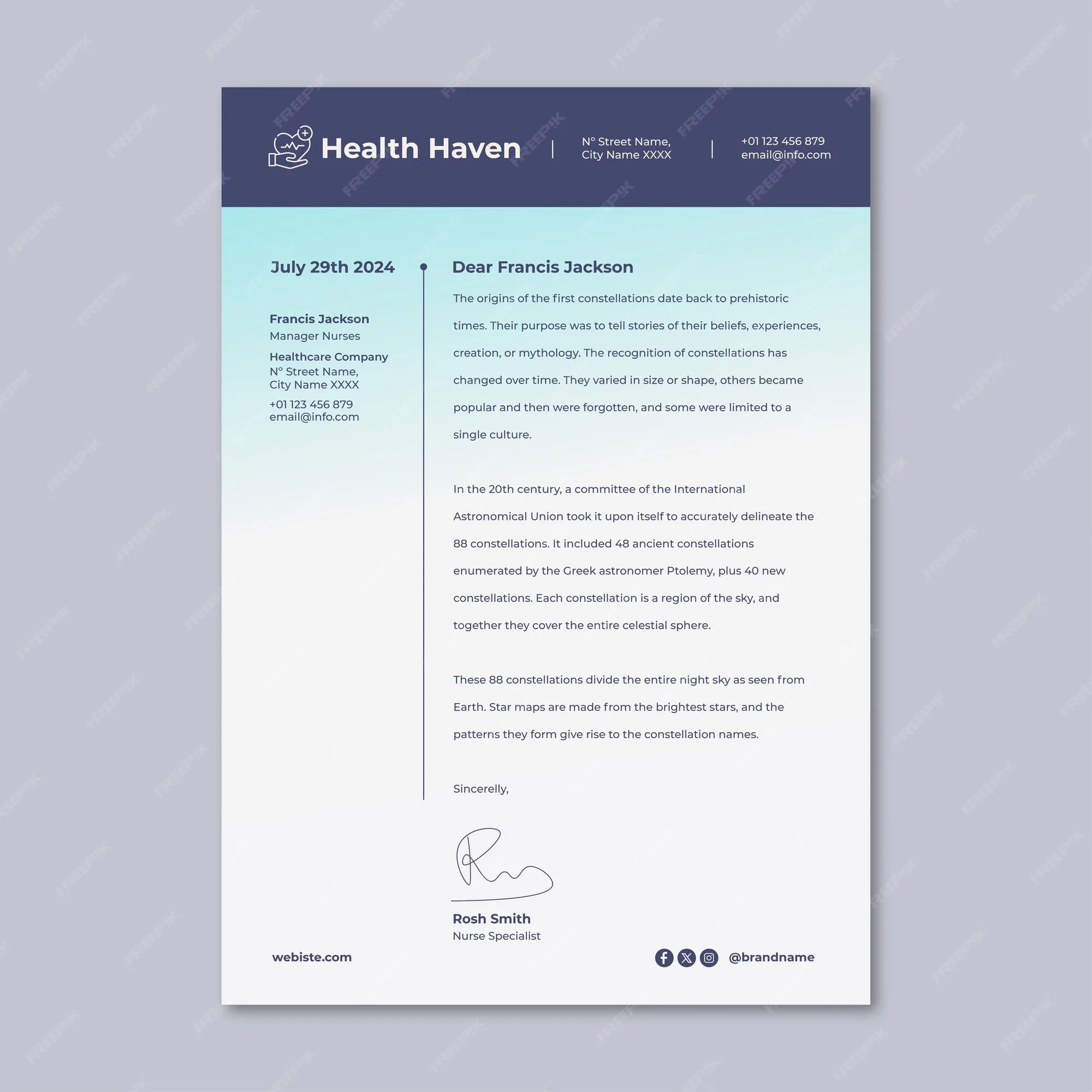
Whenever possible, quantify your achievements to demonstrate your impact. Use numbers and data to illustrate your skills and contributions. For example, instead of saying “Managed patient care,” say “Managed the care of an average of 10 patients per shift, ensuring timely medication administration and adherence to care plans.” Quantifying your achievements adds credibility and showcases your ability to achieve results. Use numbers and metrics to make your accomplishments more impactful.
Expressing Enthusiasm and Interest
Throughout your cover letter, express your genuine enthusiasm for the position and the organization. Show that you’ve researched the company and understand its mission, values, and culture. Explain why you’re particularly drawn to this specific opportunity and what makes you a good fit for the team. Mention any specific programs or initiatives that resonate with you. This demonstrates that you’re truly interested in the role and not just sending out a generic application.
Closing the Letter
Closing the Letter
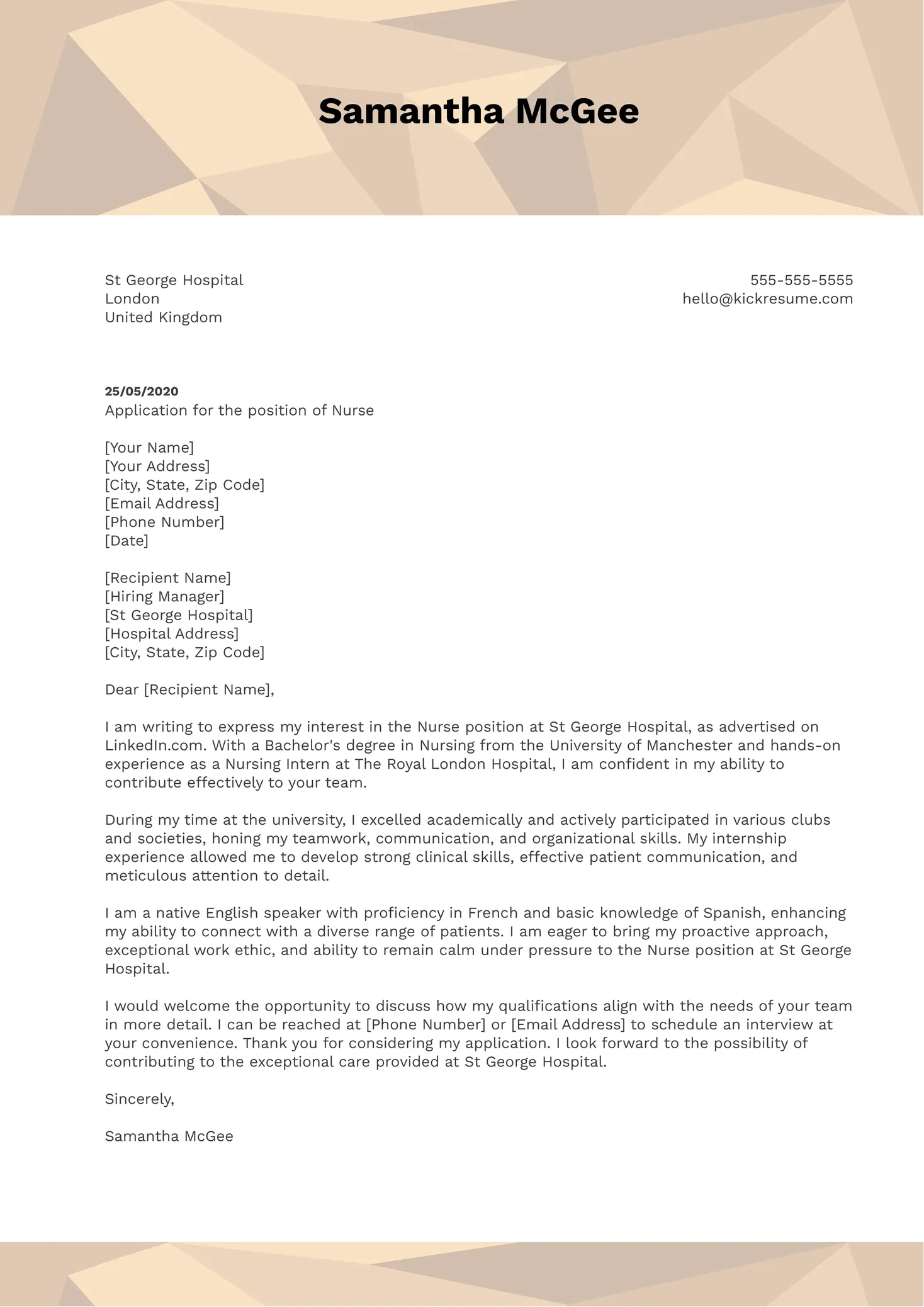
Reiterate your interest in the position and thank the hiring manager for their time and consideration. Express your eagerness to learn more about the opportunity and the organization. Reaffirm your qualifications and why you believe you are a great fit for the role. Keep your closing concise and professional, leaving a positive and memorable impression. Use phrases like “Thank you for your time and consideration” or “I look forward to the opportunity to discuss my qualifications further.”
Call to Action
End your cover letter with a clear call to action. State your availability for an interview and how you can be reached. You can also mention that you have attached your resume for their review. Provide your phone number and email address again to make it easy for the hiring manager to contact you. Ensure your call to action is professional, enthusiastic, and leaves a lasting impression. For example, “I am available for an interview at your earliest convenience. You can reach me at [phone number] or [email address]. Thank you for your time.”
Formatting Your New Nurse Cover Letter
Choosing the Right Font and Font Size
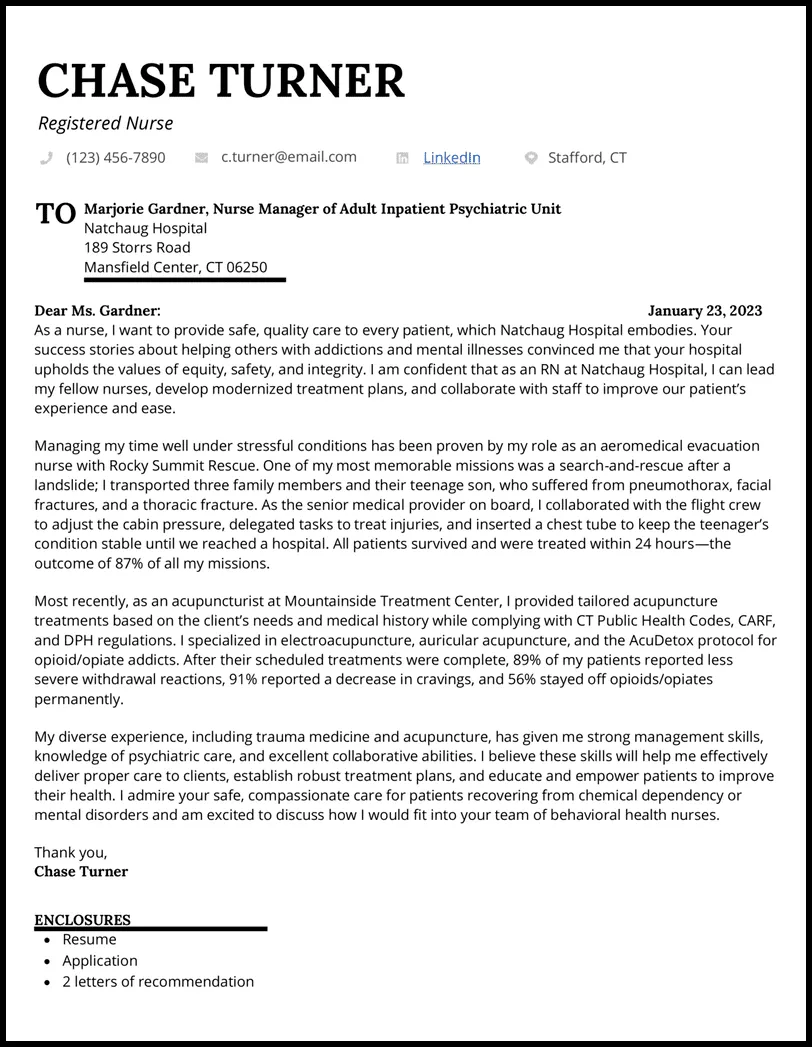
Choose a professional and easy-to-read font such as Times New Roman, Arial, or Calibri. Keep the font size between 10 and 12 points for readability. Ensure the font is consistent throughout the entire document. Avoid using overly decorative fonts, as they can detract from the content. A clean and professional font creates a positive first impression and makes your cover letter easier to read.
Proper Margins and Spacing
Use standard one-inch margins on all sides of your cover letter. Use single-spacing for the body of the letter and double-spacing between paragraphs. This creates a clean and organized appearance, making the letter easier to read and more visually appealing. Consistent formatting demonstrates attention to detail, a valuable trait in nursing.
Proofreading and Editing
Proofread your cover letter carefully for any typos, grammatical errors, or formatting inconsistencies. These errors can create a negative impression and undermine your credibility. Use a grammar checker tool, and consider having a friend or mentor review your letter as well. Ensure your cover letter is free of errors. A polished and error-free letter demonstrates your professionalism and attention to detail, crucial qualities for a new nurse.
Cover Letter Examples for New Nurses
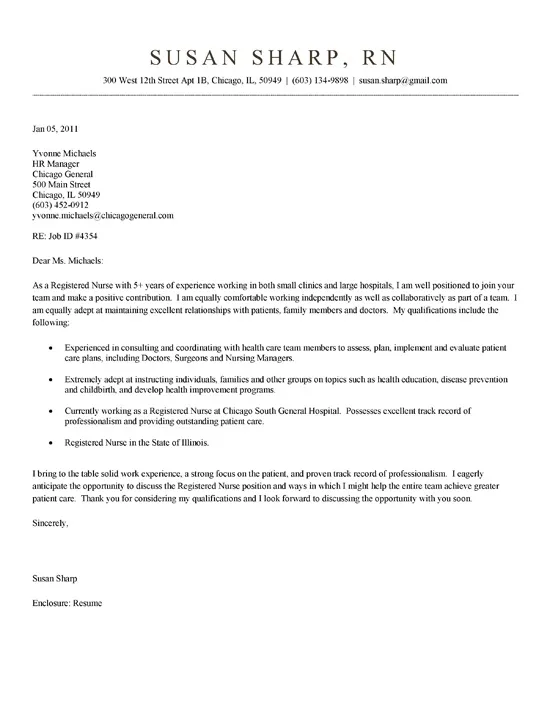
Example 1 Entry-Level Nursing Position
This example can be tailored to your experience and the specific job requirements. Remember to replace the bracketed information with your personal details and the specifics of the job posting. [Your Name] [Your Address] [Your Phone Number] [Your Email] [Date] [Hiring Manager Name] [Hiring Manager Title] [Hospital/Clinic Name] [Hospital/Clinic Address] Dear [Hiring Manager Name], I am writing to express my enthusiastic interest in the Entry-Level Registered Nurse position at [Hospital/Clinic Name], as advertised on [Job Board]. As a recent graduate from [Nursing School Name], I am eager to begin my career in nursing and contribute to a positive patient-centered environment.
Example 2 Nursing Position with Specific Skills
[Your Name] [Your Address] [Your Phone Number] [Your Email] [Date] [Hiring Manager Name] [Hiring Manager Title] [Hospital/Clinic Name] [Hospital/Clinic Address] Dear [Hiring Manager Name], I am writing to express my strong interest in the Registered Nurse position at [Hospital/Clinic Name], as advertised on [Job Board]. With my strong clinical skills and passion for patient care, I am confident I can make a significant contribution to your team. During my clinical rotations at [Hospital/Clinic Name], I gained hands-on experience in medical-surgical, critical care, and emergency settings.
Avoiding Common Cover Letter Mistakes
Generic and Uninspired Content
Avoid using a generic, one-size-fits-all cover letter that can be sent to multiple employers. Tailor your cover letter to each specific job and organization. Show genuine interest in the role and express why you are uniquely suited to the position. Generic content demonstrates a lack of genuine interest and can make your application less compelling. Customize your cover letter to the specific requirements and values of each organization.
Typos and Grammatical Errors
Carefully proofread your cover letter to eliminate any typos, spelling mistakes, or grammatical errors. These errors can detract from your professionalism and undermine your credibility. Ensure that your writing is clear, concise, and error-free. Proofread multiple times, and consider having a friend or mentor review your letter before you submit it.
Focusing on What You Want, Not What You Offer
Avoid focusing solely on what you hope to gain from the job (e.g., experience, skills). Instead, emphasize what you can bring to the organization and how your skills and experience align with their needs. Highlight the value you can provide, such as your patient care experience, your teamwork skills, and your commitment to excellence. Showing your value helps you get the job.
The Importance of Tailoring Your Cover Letter
Tailoring your cover letter is essential for creating a strong impression. Customize your letter to match the specific requirements and values of the organization and the role. Research the company and highlight how your skills and experience align with their needs. Show that you understand their mission, vision, and culture, and demonstrate why you would be a great fit. Tailoring your cover letter can significantly increase your chances of getting an interview. Creating a winning cover letter takes time and effort.
